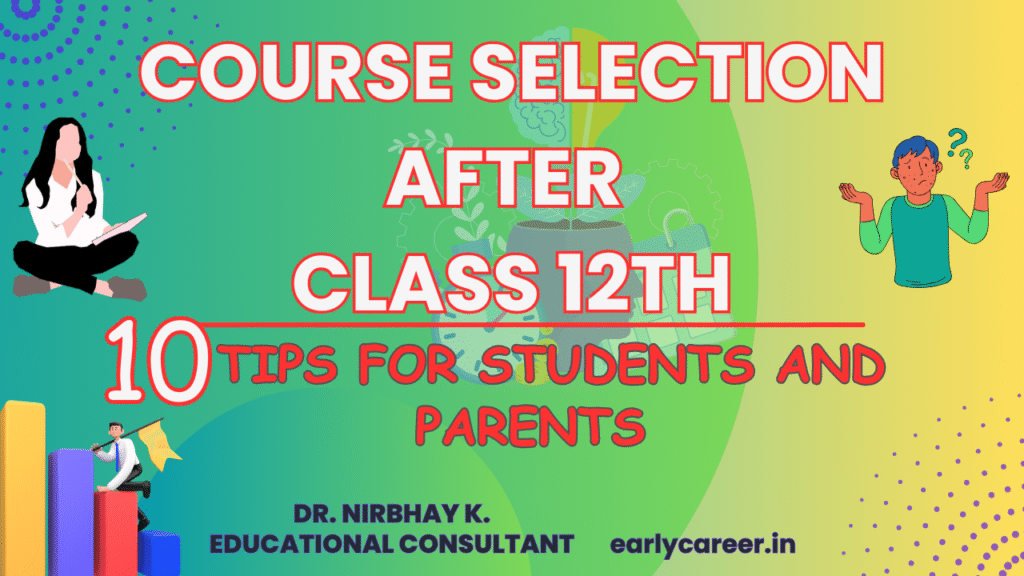
The period after Class 12th is a crucial turning point in every student’s life. With an overwhelming number of career options and peer/parental pressure, making the right course choice can be stressful. But a well-thought-out decision based on personal strengths and factual insights can set the foundation for lifelong success. Here’s a checklist of things to consider before selecting a course after 12th.
🔍 1. Know Yourself – Interests, Strengths & Passion
Before diving into courses and colleges, take a pause and ask:
- What subjects do I enjoy most?
- What kind of work environment do I envision (indoor/outdoor, desk/client-facing)?
- Do I prefer creative, analytical, technical, or social work?
Tools to help:
- Psychometric career assessments
- SWOT analysis (Strengths, Weaknesses, Opportunities, Threats)
🎯 2. Define Your Career Goals
Shortlist courses based on where you want to see yourself 5–10 years from now.
- Want to become a doctor? MBBS, BDS, BAMS, BHMS, BPT, Nursing.
- Want a corporate job? BBA, B.Com, CA, BMS.
- Prefer government jobs? Look for degree options that align with UPSC/SSC/State PSC preparation.
- Passionate about arts or media? BJMC, BA (Mass Comm), Fine Arts.
💼 3. Understand Course Scope and Career Opportunities
Research:
- Employment opportunities after graduation
- Scope for higher studies (MBA, M.Tech, PG courses)
- Demand in India and abroad
- Salaries and career growth
📌 Tip: Don’t go for a course just because a friend or relative did well in it. Career trends vary with time and individual performance.
📚 4. Course Curriculum and Academic Rigor
Look at the syllabus and subjects of the course. Are you ready to study them for the next 3–5 years?
Example:
- B.Sc. (Hons) Physics is more theoretical, whereas B.Tech in Electrical Engineering is practical + technical.
- Law demands reading and research; B.Design needs creativity and portfolio development.
🏛 5. College Reputation and Infrastructure
The same course can have different outcomes based on where it’s pursued. Check for:
- Accreditation (NAAC, NBA, UGC, NIRF ranking)
- Faculty profile and industry links
- Campus facilities
- Internship and placement support
💸 6. Financial Considerations
Evaluate:
- Tuition fees and hidden costs (hostel, books, travel)
- Scholarships, education loans, and ROI (Return on Investment)
- Affordability of professional courses like MBBS, BDS, BBA LLB, etc.
🌍 7. Location and Learning Environment
Is it a city you want to live in? Will the language or climate be a barrier?
Studying in metros may offer more exposure but comes with higher costs.
🛤 8. Backup Plan and Flexibility
Always keep a second option ready in case your first choice doesn’t work out due to entrance exams, cutoff, or personal reasons.
Example:
- If not MBBS, consider BAMS/BDS/B.Sc. Nursing/Physiotherapy.
- If not IIT, go for state engineering colleges or private universities with good placement records.
✅ 9. Eligibility and Entrance Requirements
Different courses have different selection criteria:
- Merit-based: B.Com, BA, B.Sc in many universities
- Entrance-based: NEET (MBBS, BDS, BAMS), JEE (Engineering), CUET (Central universities), CLAT (Law), NID/NIFT (Design)
Check the age limit, minimum marks, and subject combinations required.
📅 10. Trends, Demand, and Future Readiness
Consider how technology and global changes will impact jobs in the future.
- AI, Data Science, Cybersecurity, and Digital Marketing are growing.
- Environmental sciences, mental health professions, and creative careers are gaining importance.
Stay updated with:
- Industry reports
- Skill demand studies by NSDC, NASSCOM
- Government initiatives (like Skill India, Startup India)
Selecting a course after 12th is not just about “getting a degree.” It’s about aligning your passion, potential, and purpose with real-world opportunities. Take your time, research deeply, and seek guidance from mentors or career counselors when in doubt.
“Choose with Clarity, Not Confusion.”
